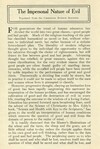

Are you sure?
This bookmark will be removed from all folders and any saved notes will be permanently removed.
The Impersonal Nature of Evil
For generations the trend of human education has divided the world into two great classes,—good people and bad people. Much of the religious teaching of the past has classified humankind as saved or lost, without reference to individual merit, but rather because of a definite foreordained plan. The liberality of modern religious thought gives to the individual the opportunity to effect his salvation through the choice of righteousness, but still draws its line between good and bad people. Advancing thought has rebelled, in great measure, against this extreme classification, for the very evident reason that the good people are often found guilty of startling inconsistencies, while the so-called evil people have been moved by noble impulses to the performance of great and good deeds. Theoretically a dividing line could be drawn, but in practice it could not be made to adjust itself to the men and women whose lives it attempted to classify.
However, progressive thought, obeying an instinctive love of good, has been rapidly outgrowing this narrower interpretation of the human problem, and has encouraged the cultivation of good and the destruction of evil in every life, trusting the outcome to the wisdom of a loving Father. Education has pressed forward upon broadening lines, until the advent of the Science of Christianity in Mrs. Eddy's book, "Science and Health with Key to the Scriptures," has given to the world an interpretation of human conditions which removes the question of good and evil from the domain of person to the realm of mind.
It is readily discerned that the Master's illustrations of the wheat and the tares, the sheep and the goats, are of little ethical value to-day unless the disciple applies them to his own good and evil thinking, rather than to the fate of good and bad people. The perplexing query as to who shall be saved and who shall be lost, resolves itself into the question of what shall be saved and what shall be lost, and as the world recognizes the eternity and indestructibility of good, and the perishable and passing nature of evil, every man's right to achieve permanent right thinking, and consequently permanent salvation, will be established. It is evident that thinking governs the situation, for right thinking expresses itself in right living, and right living has for its end salvation, inasmuch as it cannot be condemned.
Enjoy 1 free Sentinel article or audio program each month, including content from 1898 to today.
JSH Collections
This article is included in:
1903 - PAMPHLET
The impersonal nature of evil
JSH-Online has hundreds of pamphlets, anthologies, and special editions for you to discover.

October 17, 1903 issue
View Issue-
"If Ye Abide in Me"
M. A. GAYLORD
-
Tuning the Harp
W. D. MC CRACKAN.
-
Our Sunshine Bank
A. B.
-
The Dividing Line
LOUIS HELM
-
A Voice in the Wilderness
JAMES J. ROME
-
The Unit of Principle
FLORENCE W. FLOURNOY
-
The Impersonal Nature of Evil
BLANCHE H. HOGUE
-
Perhaps no religious movement of later years has enjoyed...
ALBERT E. MILLER
-
Christian Science is a religion, not a method of practising...
CLARENCE A. BUSKIRK
-
The Lectures
with contributions from Charles L. Wallace, S. M. Weaver
-
MRS. EDDY TAKES NO PATIENTS
Editor
-
A Refutation
ALFRED FARLOW
-
It was in June, 1887, that I first heard the words Christian Science
SARAH A. WILLIAMS with contributions from BERTHA BARKER
-
The following is a demonstration of Christian Science...
ANNABEL ROBINSON
-
Last January, I went to spend the winter months on the...
KATHARINE S. EWING
-
Many testimonies as to the value and practical working...
J. A. B. with contributions from H. G. W.
-
May I contribute an expression of my deepest gratitude...
LETTIE H. PFEUFFER
-
The Concordance fills a long-felt need in our Christian Science...
ANNIE H. GILMORE
-
Understanding
EDNA WADSWORTH HUDSON
-
Notices
with contributions from STEPHEN A. CHASE


